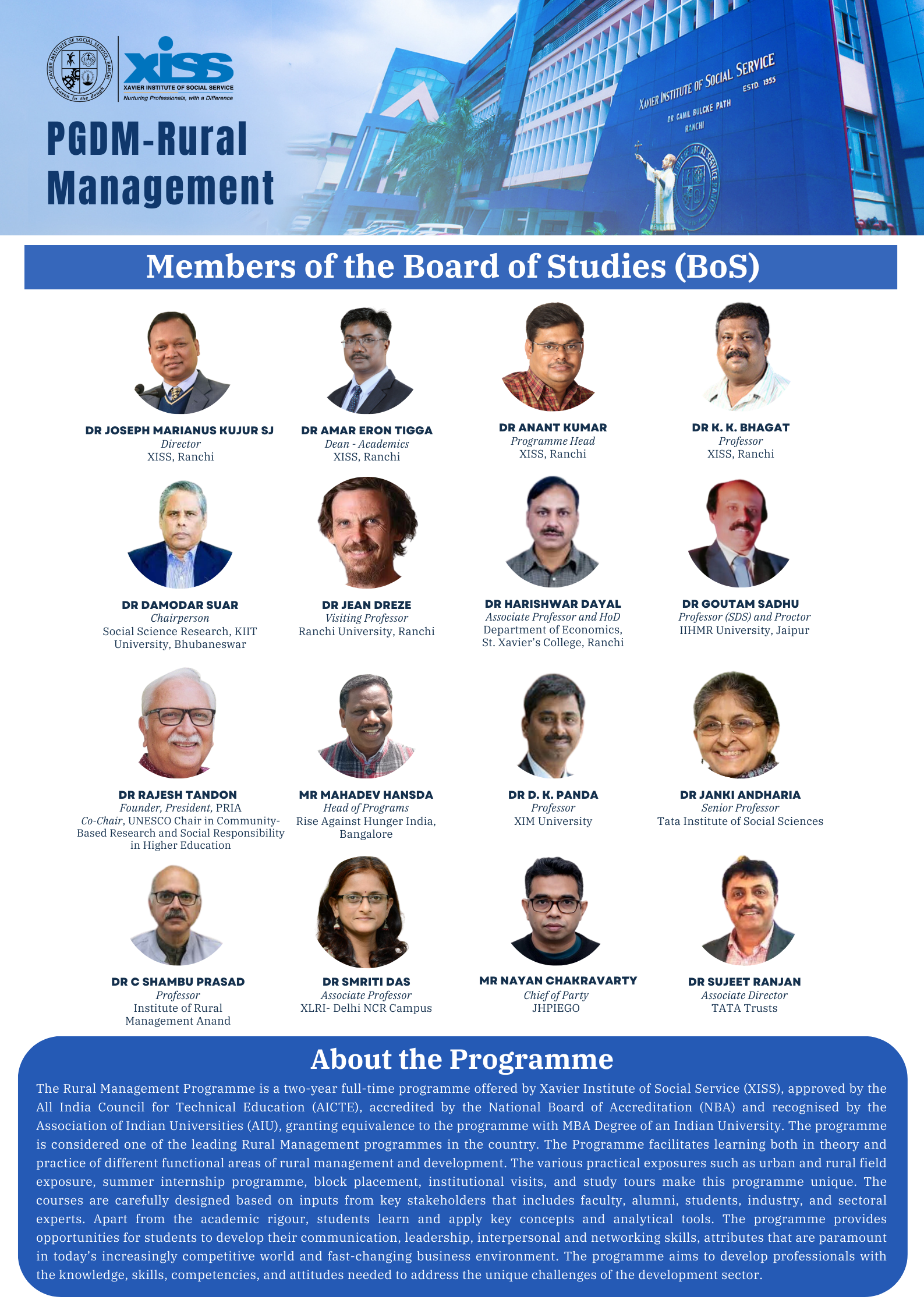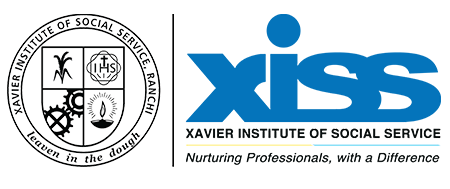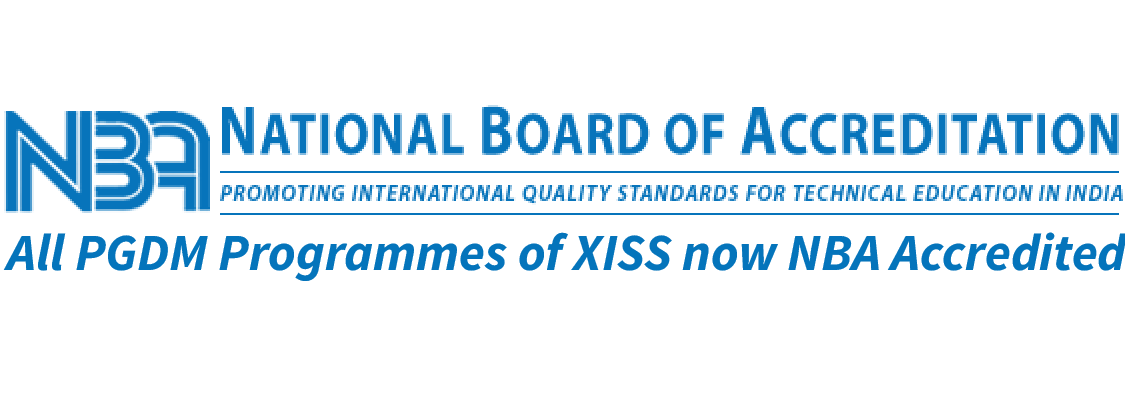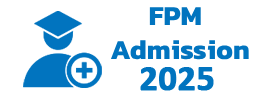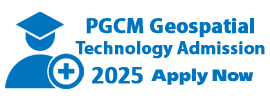Programme Overview
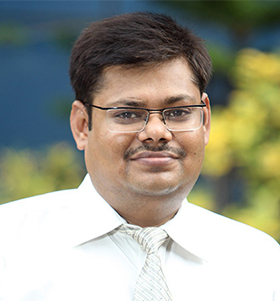
Dr Anant Kumar
Head, PGDM
(Rural Management)
The Post-Graduate Diploma in Management (PGDM) is one of the flagship programme of XISS. This is a two-year full-time programme. The PGDM(Rural Management) Programme of XISS is rated as one of the best in the rural management field in the country. The Programme facilitates learning in theory and practice of different functional areas of management, and development is carefully designed based on inputs by key stakeholders including faculty, alumni, students, and industry experts. Apart from the academic rigour which ensures that students learn and apply key concepts and analytical tools, the Programme also provides opportunities for students to develop their communication, leadership, interpersonal and networking skills, attributes that are critical in today’s increasingly competitive world and fast-changing business environment. The Programme equips a student with requisite knowledge and skills, required for playing leadership roles in the manufacturing and services sectors in India and abroad.
The PGDM(Rural Management) Programme of XISS is designed to achieve the following objectives:
Programme Educational Objectives (PEO) for Rural Management
-
Attain global level academic excellence by fostering sustainable development
-
To imbibe social concern among students and faculty members
-
To facilitate rural empowerment and affirmative actions through leadership development with humane face
A. Programme Outcome (PO) for PGDM(Rural Management)
With these objectives a structured course has been designed. The PGDMRM programme is expected to enable the graduates to:
-
Apply the knowledge of management/ development theories and practices to solve the problems related to rural development/ business.
-
Foster analytical and critical thinking for evidence/data based decision making.
-
Develop value based leadership ability.
-
Understand, analyse and communicate economic, legal, global, and ethical aspects of business and development.
-
Lead themselves and others in achieving organizational goals and contributing effectively to a team environment.
B. Programme Specific Educational Outcome (PSEO) for PGDM(Rural Management)
Act as agent for rural empowerment and affirmative actions by inculcating social concern.
-
Understand and pursue sustainable development both at local and global level.
-
Foster analytical and critical thinking for evidence/data based decision making.
Course Structure for PGDM (Rural Management)
Trimester - I |
|
|---|---|
| Code | Name of Paper |
| R101 | Theories and Perspectives of Development |
| R102 | Rural Social Structure in India |
| R103 | Indian Economy and Rural Development |
| R104 | Development Administration and Local Self-Governance |
| R105 | Communication for Development |
| R106 | Business Communication, Soft Skills and Personality Development |
| RP107 | Institutional Visit |
| RP108 | Urban Field Exposure-I |
Trimester - II |
|
|---|---|
| Code | Name of Paper |
| R201 | Financial Accounting |
| R202 | Research Methodology and Participatory Rural Appraisal |
| R203 | Managerial Economics |
| R204 | Principles of Management |
| R205 | Project Management |
| R206 | Behavioural Science |
| RP207 | Rural Field Exposure-I |
| RP208 | Urban Field Exposure-II |
Trimester - III |
|
|---|---|
| Code | Name of Paper |
| R301 | Statistics for Social and Business Research |
| R302 | Development Policies and Programmes |
| R303 | Management Information System |
| R304 | Business Development and Grant Proposal Writing |
| R305 | Management of Institutions |
| R306 | Organizational Behaviour |
| RP307 | Rural Field Exposure-II |
| RP308 | Block Placement |
| RP309 | Comprehensive Viva-Voce |
| RP310 | Performance Evaluation |
Trimester - IV |
|
|---|---|
| Code | Name of Paper |
| R401 | Child Rights, Gender and Development |
| R402 | Livelihood Promotions and Skill Development |
| R403 | Rural Financial Services and Micro Finance Institutions |
| R404 | Public Health |
| R405 | Training for Development |
| R406 | Natural Resource Management, Environment and Climate Change |
| R407 | Financial Management |
| RP408 | Summer Internship Project |
Trimester - V |
|
|---|---|
| Code | Name of Paper |
| R501 | Agriculture, Organic Farming and Biodiversity Management |
| R502 | Disaster Management and Risk Reduction |
| R503 | Corporate Social Responsibility and Sustainability |
| R504 | Operations Research |
| R505 | Data Analytics for Rural Management |
| R506 | GIS and Remote Sensing |
| R507 | Public Policy Analysis |
| RP508 | Study Tour |
| RP509 | Dissertation Thesis Writing |
Trimester - VI |
|
|---|---|
| Code | Name of Paper |
| R601 | Management of Slums and Rurban Areas |
| R602 | Rural and Social Marketing |
| R603 | Entrepreneurship Development: Micro and Small Business Management |
| R604 | Agri-Business Management |
| R605 | Micro Insurance and Risk Management |
| R606 | Supply Chain Management |
| R607 | Human Resource Management |
| RP608 | Rural Field Exposure-III |
| RP609 | Comprehensive Viva-Voce |
| RP610 | Performance Evaluation |
